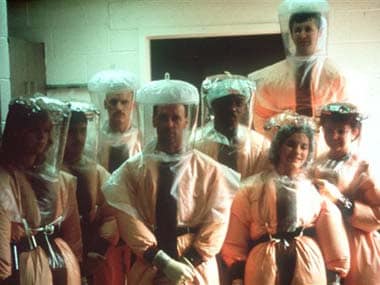Six passengers transiting through Delhi to Mumbai had been isolated and taken to a government hospital in the national capital for tests to determine whether they have Ebola. Of the six people there were two women and a child who arrived at the airport from Ebola-hit Liberia, were quarantined and taken for further tests. However, these passengers were later tested negative for Ebola. [caption id=“attachment_1675459” align=“alignleft” width=“380”]  US workers treating Ebola patients in protection gear. Representational Image. AP[/caption] The Mumbai and Delhi international airports have been placed on full alert, as 114 Indian nationals returned from the Ebola-hit Liberia on Tuesday. Elaborate precautionary measures were taken to screen these 114 people as they arrive at the airports. All 85 Indians who arrived in Mumbai from Liberia and Nigeria on Tuesday were cleared by the Airport Health Organisation as none had any symptoms of the deadly disease. These passengers arrived in three batches with more to follow in the day, Mumbai International Airport Limited (MIAL) said in a statement. The first group of 20 passengers arrived on board South African Airways flight SA 284 at 5 am from Liberia via Johannesburg and were cleared by the APHO team after screening under supervision of health ministry officials. None of them showed any symptoms of Ebola or had a history of contact with anybody afflicted with the disease, MIAL said. While passengers without any symptoms are being cleared and shifted to the terminal for immigration and customs clearance, those coming from Liberia with symptoms suggestive of Ebola, are being directly shifted to designated hospitals by ambulance from the bay, Mumbai International Airport Limited (MIAL) said in a statement. Earlier this month, the union government had acknowledged the possible, although very distant, threat of Ebola virus reaching Indian shores. While the union health minister Dr Harsh Vardhan maintained that the threat was low, measures were put in place to face the situation if the virus reaches India. Reportedly, advisories were issued to state disease surveillance units for early detection and management of travel related cases. If it all it happens in India, it would be through people travelling back from the African countries where its outbreak has been reported — Guinea, Nigeria, Liberia and Sierra Leone–like the ones being carried out now. Diagnostic facilities were also established at the National Institute of Virology in Pune and National Centre for Disease Control in Delhi. “As a matter of abundant precaution, the government would be obtaining details of travellers originating or transiting from Ebola virus affected countries to India from the concerned Airlines and Indian Missions and tracking these persons after their arrival, up to their final destination,” the minister had said, according to an Indian Express report. The real source of this threat are the close to 45,000 Indians living in the Ebola hit areas. This includes about 300 CRPF personnel in peacekeeping. “About 500 Indians were in the Republic of Guinea, 3,000 in Liberia and 1,200 in Sierra Leone, from where the maximum cases have been reported. Nigeria has a much larger presence of nearly 40,000 Indian citizens,” the report said. The paper quoted Vardhan as saying that they might return if the situation worsens. In such a case, some of them might carry the virus. Frequent travel between the African continent and India, in case even one person lands in the community with the virus we should be prepared to deal with it and avoid its spread. While the spread of the infection can be stopped, it requires isolation of the infected patient with great alacrity. According to the Associated Press: “Isolating anyone with symptoms while testing is done, taking precautions while providing them medical care and tracking down anyone they were in close contact with when they got sick. Those who have had direct contact with an Ebola patient are advised to take their temperature twice a day for three weeks, the incubation period for the disease. If they show symptoms, they should then be isolated and tested.” Therefore it becomes clear that apart from constant monitoring, the country’s health machinery has to be strong, and its health force adequately trained to deal with an infection this dangerous. That is probably where India might falter if it were to deal with an infection. It not that India does not have means to handle it, but communities and people need to be extremely vigilant. The biggest challenge will be getting the message out to people and compel them, in case there is a threat, to change behaviour.
While passengers without any symptoms will be cleared and shifted to the terminal for immigration and customs clearance, those coming from Liberia with symptoms suggestive of Ebola, will be directly shifted to designated hospitals by ambulance from the bay, it said.
Advertisement
End of Article


)

)
)
)
)
)
)
)
)



